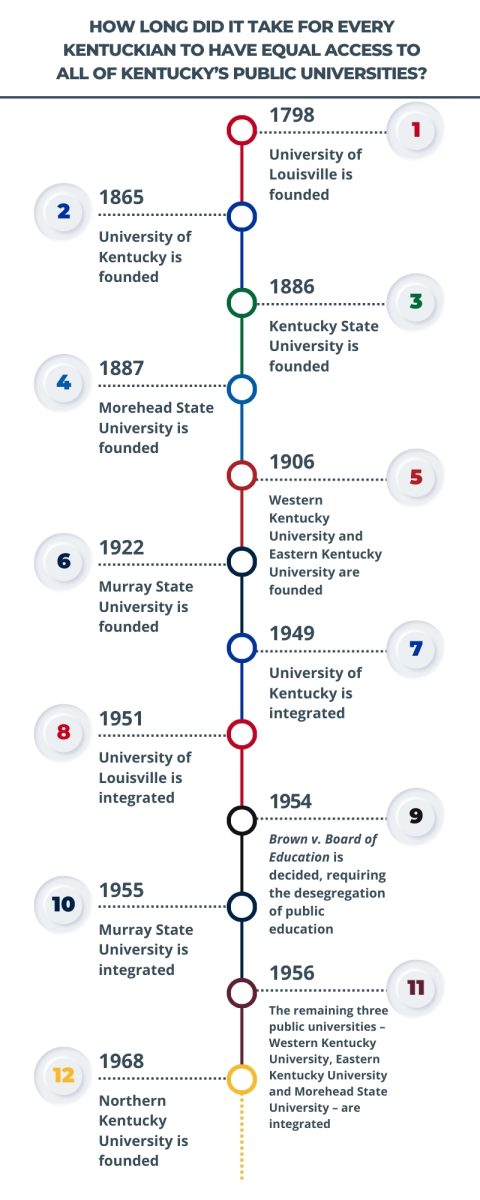Kentucky state legislators have put forth an attack on diversity, equity and inclusion (DEI) across the commonwealth’s public university campuses, failing to recognize these initiatives are the best way to preserve the commonwealth’s future.
Out of touch lawmakers are working to remove programs that create a safe space for difficult discussions and an atmosphere of acceptance and belonging that all young people deserve to find. This is an appalling attack on young people and their education that should not have been allowed to make it this far, and it should not be allowed to continue.
University officials have been hesitant to take a stand, which is why we, the editorial boards of independent, student-run newspapers at seven of Kentucky’s public universities, felt we must.
We call on the Kentucky General Assembly to not take up legislation in the future that seeks to eliminate DEI from the commonwealth’s public universities.
It appalls us that the effort to eliminate DEI protections and initiatives was even given life in the General Assembly. Every person deserves to feel comfortable in making the commonwealth their home, and taking away initiatives that promote diversity will push Kentucky farther into the past.
On Feb. 13, the Senate passed Senate Bill 6. A month later, the House amended the bill with original language from House Bill 9, and voted to pass. The bill returned to the Senate with stronger attacks on diversity while eliminating race-based scholarships for students, mandatory DEI training and orientations, required courses and more.
In January, SB 6 sponsor Sen. Mike Wilson said the bill would outlaw the teaching of “discriminatory concepts” like the belief that some individuals are “inherently superior” to others within the classroom and across faculty initiatives.
Days later, Rep. Jennifer Decker introduced HB 9, an aim to strip all DEI initiatives on college campuses. Anything deemed to be “differential treatment” would be prohibited and defunded, including dedicated offices and positions.
Following months of debate and public outcry, the Senate chose not to vote on concurrence with the updated SB 6 before entering the veto period last night. While the General Assembly could still pass a version of the legislation upon returning from the veto period on April 12, they would be unable to override a veto by Gov. Andy Beshear.
This legislation represents a threat to Kentucky’s higher education that their sponsors refuse to acknowledge. It presents Kentucky as a land of archaic ideals, where bygone values endure despite changes of modern times.
It was less than 70 years ago when the last three of Kentucky’s public universities fully desegregated their campuses. Before 1949, Black Kentuckians had no real option of attending a public university in the commonwealth other than Kentucky State University, which was founded in 1886 as an African American teachers college.

That is not the Kentucky we know now. We have come of age in a place that thrives on, encourages and advances equity, and many of us grew up supporting the fight to protect it.
Watching our commonwealth’s progress toward equality be systematically dismantled is unimaginable, especially for today’s standards. Diversity, equity and inclusion have been — and continue to be — foundational pillars to our college campuses.
DEI initiatives encourage students of color to attend college in Kentucky. According to BestColleges, over half of the students surveyed “would consider transferring if their college were to abolish diversity, equity, and inclusion (DEI) initiatives.” Even more prospective students said they’d reconsider their decision if a college they were considering had “abolished DEI initiatives.”
When students do not see themselves at Kentucky’s universities, they will have no desire to attend them, either.
Similar legislation has been enacted in other states, resulting in employees being fired because the law no longer allows for their positions. These are not simply numbers. These are people’s lives.
The lawmakers who are sponsoring and supporting this legislation fail to envision the future and recognize the inherent value of engaging with all of our unique perspectives and lived experiences in the classroom and on campus.
Difficult discussions on Kentucky campuses allow students to think critically about the world around them, with the guidance of professors well-researched and immersed in their fields. They are not “indoctrinating” students against their will; they are expanding our perspectives to include all of our lived experiences.
Classrooms are meant to be safe spaces for discussions and debates with the purpose of education, not political theater.
Our universities have long, rich histories that have only been made greater by students who come from diverse backgrounds and walks of life.
At Murray State University, for example, Mary Holland was the first Black student to attend the university and Nancy Tyler Demarta was the first Black graduate. Another notable figure, Black faculty member Marvin Mills, founded the occupational safety and health major and played a pivotal role in the creation of the Dr. Marvin D. Mills Multicultural Center.
In similar light, at Eastern Kentucky University, Cynthiana native James Way became the university’s first Black professor in 1967, teaching classes in industrial technology, according to the Notable Kentucky African Americans Database. Following Way, his children, James, Jannette, William and Melissa, were the first Black students to attend Eastern’s Model Laboratory School.
Thanks to their work and the work of countless other individuals, each of our universities are places where faculty are able to educate students about the realities of the past. Because of their efforts, we feel safe and valued in such spaces and our institutions have been enriched by their presence.
This legislation threatened to upend this progress, yet we are not sure the fight is over.
SB 6 promises academic freedom, but make no mistake: it brings academic restriction at best, and pure censorship at worst. This bill — and those who support it — simply wishes to see traditionally left-leaning topics eliminated from the classroom curriculum entirely.
Such a decision not only has the potential to eliminate valuable classroom discussions and push prospective students away but could turn away faculty and staff who are foundational to building a better future for individuals and for the commonwealth.
At Northern Kentucky University, associate dean and professor Danielle McDonald said the role of the professor is to guide the classroom conversation and encourage students to come to their own conclusions. Introducing new perspectives and creating an environment of inclusivity is already the mission of professors, McDonald said — not presenting a topic as absolute truth.
At Western Kentucky University, members of faculty have not only stated in response to the legislation that there are many who have begun to look for employment elsewhere, but that they cannot, in good conscience, look a high school student in the eye and encourage them to attend a public university in the state.
If Kentucky is to be the future, our lawmakers should draw in the leaders of the future, not scare them away. Universities are where key learning and foundational work happens, and Kentucky universities must be that place for Kentucky leaders.
It takes more than just our voices to fight against such an injustice, however.
Only one university president, Eli Capilouto of the University of Kentucky, has spoken out against the bills. Other university presidents — Bob Jackson of Murray State University, Kim Schatzel of the University of Louisville, Timothy Caboni of Western Kentucky University and Cady Short-Thompson of Northern Kentucky University — have gone as far as acknowledging the importance of DEI on their campuses.
Presidents Jay Morgan of Morehead State University, Koffi C. Akakpo of Kentucky State University and David T. McFaddin at Eastern Kentucky University have yet to release a statement on the legislation or DEI.
The statements of support for DEI are not nothing, but they are not enough in the light of the threat DEI initiatives are facing. So many people in each of these campus communities have spoken out against the bill, leaving many wanting more.
Many of our institutions’ mission statements or strategic plans support diversity, equity and inclusion. There is value in these initiatives. It shows they understand their necessity and that they support providing a helping hand to groups that need it. A response from our university presidents is not an unreasonable request.
The commonwealth’s universities should have stood in solidarity against these bills. Standing in solidarity reduces the likelihood of repercussions against individual universities while showing Kentuckians that their voices are being heard by those in power.
Instead, it is left to students to pick up the torch and continue fighting where those above us fail. University administration is not taking a stand, so we are.
Protecting diversity in Kentucky creates spaces for students to feel safe, seen and heard. It is a simple fact that different groups of people have been systemically discriminated against and not given equal educational opportunities.
Great progress has been made in recent decades, but we have to recognize that discrimination is an issue that will never be fully resolved. We do not live in a perfect world, and there is always work left to be done.
Abolishing DEI eliminates decades of steadfast, hardfought progress that has been made. It will encourage high schoolers who are looking at colleges to attend a university located anywhere but in Kentucky. It tells students of diverse backgrounds that they are not welcomed on campuses where they are hoping to build the beginning of the rest of their lives.
We call on the General Assembly to do better. We call on the General Assembly to realize that DEI initiatives and the discussion and acceptance of diversity are in the best interest of every single student, faculty and staff member at each public university campus in the commonwealth.
Despite what certain lawmakers in Kentucky and around the nation might think, diversity is not going away. The world is moving forward, and Kentucky cannot be left behind.
This editorial was drafted and approved by the student editorial boards of independent student news organizations at seven of the commonwealth’s public universities: the College Heights Herald at Western Kentucky University, the Eastern Progress at Eastern Kentucky University, the Murray State News at Murray State University, the Louisville Cardinal at the University of Louisville, The Northerner at Northern Kentucky University, Thorobred News at Kentucky State University and the Kentucky Kernel at the University of Kentucky.

If you would like to submit a reaction to a piece, Letter to the Editor or other submission to the College Heights Herald, please send it to Commentary Editor Price Wilborn at herald.opinion@wku.edu or edwin.wilborn835@topper.wku.edu.
If you would like to submit a Letter to the Editor or an opinion to the Eastern Progress, please send it to Editor-in-Chief Rosemary Kelley at progress@eku.edu or Managing Editor Jess Wilson at jessica_wilson314@mymail.eku.edu.
If you would like to submit a Letter to the Editor, reaction piece or other submission to The Murray State News, please email Editor-in-Chief Jillian Smith at jsmith194@murraystate.edu or Opinions Editor Scottlynn Ballard at sballard11@murraystate.edu.
The Louisville Cardinal welcomes submissions from readers for publication in our opinions section. If you’d like to submit a piece, please email editor@louisvillecardinal.com or Editor-in-Chief Tate Luckey directly at tluckey@louisvillecardinal.com.
If you would like to submit a Letter to the Editor or other submission to The Northerner, please email Editor-in-Chief Braden White at whiteb15@nku.edu.
If you would like to submit a reaction to a piece, Letter to the Editor or other submission to Thorobred News, please email ksuthorobrednewseditor@yahoo.com or Editor-in-Chief Ashanti Grace Castleberry at ashanti.castleberry@kysu.edu.
If you would like to submit a Letter to the Editor or another form of submission to the Kentucky Kernel, please email Editor-in-Chief Hannah Stanley at editor@kykernel.com.


























































































